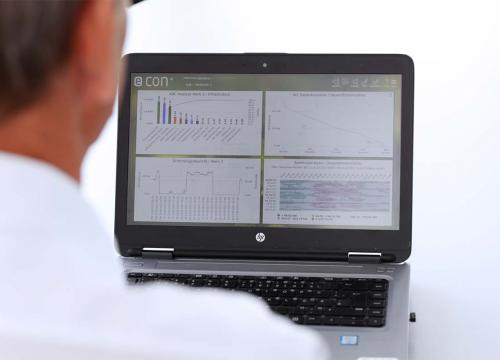"There is no turnaround, but econ will change."

Interview with Till Boeder, Managing Director of econ solutions
"There is no turnaround, but econ will change."
Till Boeder took over as Managing Director of econ solutions on October 1, 2022. In this interview, he reveals what particularly appeals to him about this position, how he describes his management style and what goals he has set for econ.
Mr. Boeder, would you like to start by briefly introducing yourself?
With pleasure. I am 33 years old and live with my family in Mannheim. After studying mechanical and industrial engineering, I took on my first full-time job at BFE Institute for Energy and Environment in 2013. Before that, however, I had already gained professional experience during my dual studies and as a part-time engineer during my studies. I started at BFE as an energy manager, and a good year later I was able to take over the management of a group that promoted the area of renewable energies at BFE. In 2016, I was then given the opportunity to take over the management of the branch customer department. Initially, this included a DIY store and a furniture retail chain, but we quickly acquired other customers and the department expanded rapidly.
From 2019, a project at BFE and econ parent company MVV Enamic, in which I was involved as head of the Customer Solutions unit, was very influential. The aim was to explore new ways of cooperation between the partners within Enamic. It gave me a very deep insight into the solution house that the various partners within MVV Enamic form. One important experience was that each partner brings its own expertise to the solution house, which ultimately creates added value. For me, it was also the step from the mental boundaries at BFE to a greatly expanded horizon across the entire Enamic solution house. Since September 2021, I have been focusing more on BFE again as Head of Customer and Data Analysis and authorized signatory. And since October 1, I have been managing econ solutions.
You spent nine years at BFE - obviously a perfect match.
Yes, that's true. BFE is so flexible that you can develop and try things out there. Although BFE is part of a group - as is econ - the company is still small enough that you can develop as a person. That was a lot of fun, with all the ups and downs - which are always part of it. There was a very strong sense of team spirit among my colleagues. They were very instructive and great years, during which I was given a lot of trust.
Why the move to econ now?
econ and BFE work very closely together because the issues that customers have are very similar and the skills and services complement each other perfectly in order to work on these issues together. In this collaboration in particular, we have noticed that there is still a lot of potential for econ, and of course we want to leverage this - not only in the collaboration, but also for econ alone. econ still has a lot of opportunities to develop further and the market is calling for it. This played a major role in our decision to take over the management.
In which areas do you see this potential for econ?
econ has a very important role to play, and not just in the solution house. With its energy management software, econ is one of the pioneers and market leaders. We have grown strongly so far, which is very positive. However, developments on the market have now become incredibly dynamic. Laws and regulatory requirements are often very fast-moving and customers - both at BFE and at econ - have to deal with them. On the one hand, there is the challenge of keeping pace with these rapid developments. On the other hand, the demands and challenges of our customers have become very individual and go beyond what econ currently offers. econ is very strongly focused on energy efficiency. And even if energy efficiency is a common thread running through the new requirements and regulations, topics such as sustainability or decarbonization may "swallow them up".
What do you mean by that?
For companies that set out to become more sustainable, energy efficiency can quickly fall by the wayside. There is a risk that a company will "greenwash" itself without really saving energy. That's not econ and that's not MVV either. We are the implementation units and ensure that a company actually becomes climate neutral. That is a significant difference.
Do you already have concrete ideas and approaches for econ?
Yes, we do. econ is very good at creating transparency about energy volumes and energy flows. In order to maintain our leading position, we will expand our focus and provide companies with this transparency in future, including on topics such as decarbonization and sustainability. This will enable them to define and prioritize measures that actually reduce both their consumption and their greenhouse gas emissions. To this end, we will work more closely with our solution house partners, as well as with third parties.
This means that econ will change. However, we will not compete with largeCO2 balancing companies. The existing business will remain important and will even become increasingly important. So there will be no turnaround, but a further development.
In the current situation with massively rising energy prices, are companies still concerned with sustainability or rather with saving energy costs?
It's a mixed bag: some companies say: I'm only concerned with costs so that I can ensure my economic survival. That's dramatic! There are others who say: I have to save energy now because I have corresponding obligations or gas supply bottlenecks. This is where econ is very strong, because the solutions help companies to determine where they can save energy, what must continue to run, what can be switched off and how much this will bring.
However, there are also many companies that have already started to position themselves according to sustainability criteria. They too are now concerned with not suffering from high costs, becoming more independent or saving energy. But they are also asking themselves: how can we still achieve our goal of becoming climate-neutral? As a result, econ's customer base has expanded.
In what way?
econ mainly comes from the industrial sector and has a strong position here. Now we are also being approached by clinics and healthcare associations, for example. They are not interested in tax savings, as was sometimes the case in industry. They really want to understand what is actually going on in their company in terms of energy. The motivation here does not come from production, but from the commercial area and the obligations arising from regulations and reporting, e.g. the EU taxonomy. But social developments are also driving companies to become more sustainable. We are the point of contact for them and support them in their transformation process, also together with our partners from the solution house.
This means that it is no longer just about energy management, but much more. The boundaries between energy and environmental management systems, or between saving costs and emissions, are becoming increasingly blurred. As econ, we will lead the way in this change.
Like BFE, econ is part of the energy company MVV. What does that mean for econ?
MVV offers enormous weight in terms of market presence and brand, customer structure and stability. This is clearly an advantage for a growing company like econ. And the link with the specialist partners offers unique development opportunities that econ can and will use both on its own and together with the other companies. At the same time, it is important to remain agile.
Our customers also benefit from our affiliation with MVV. They receive services, products and solutions that are coordinated with each other and generate added value. The fact that this is actually perceived as an advantage can be seen in the great development of the Group and the partner companies.
As Managing Director, you not only play a decisive role in shaping the direction of econ, but also the cooperation within the company. What is important to you here?
Even if a company has hardware and software products like econ, it is the employees, the colleagues, who make the difference. They make up econ, that is very, very important. Through my experiences as a manager and as a supervisor myself, I am convinced that they should be treated as equals. Only then can we act together and move the company forward together.
At 33, you are still relatively young for the position of Managing Director. What would you say is the advantage or disadvantage?
I think it's ideal: I've already gained the experience needed to take on such a position and at the same time I'm still willing to learn and not stuck in rigid patterns. I'm really looking forward to developing econ further together with my colleagues.


